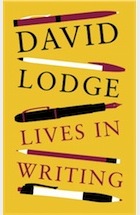Lives in Writing by David Lodge – review

David Lodge at his home in Birmingham. Photograph: Sophia Evans for the Observer
When Graham Greene published his novel A Burnt-Out Case in 1960, an article appeared in the Daily Express predicting a great deal of "guessing in Fleet Street" about the real-life model for the lying muckraker Parkinson. It may sound an unlikely subject of national interest, but journalists are interested in other journalists, and newspapers have to be filled. What's strange is that the biographer Norman Sherry chose to revive the guessing game, half a century later, in the pages of a biography. "Could it have been Greene's old sparring partner John Gordon?" Sherry asks, before deciding that it could not have been. "Gordon was honourable", whereas Parkinson showed a "disdain for facts". He worked for the Sunday Express, a paper that would never print "anything remotely risque". Plus: wrong build.
 Instead, Sherry alights on Greene's friend Ronald Matthews, a one-time journalist and the author of a book, Mon Ami Graham Greene, disliked by its subject, much as Parkinson writes articles disliked by Querry, the architect in A Burnt-Out Case. The discrepancy in physical types, used to disqualify Gordon, is here submitted as conclusive evidence, the expression "tug of guts" being, Sherry claims, "a deliberate physical exaggeration to prevent his friend from being recognised". Sherry suspects that Matthews managed to recognise himself, despite the fat-suit, but didn't say anything because Greene had paid for his son's education. "That itself to Ronald Matthews would have been worth the pain of an unfriendly and perfidious fictional portrait." By the end of the exercise, Sherry has tied himself in all kinds of knots and what have we learned? Exactly nothing.
Instead, Sherry alights on Greene's friend Ronald Matthews, a one-time journalist and the author of a book, Mon Ami Graham Greene, disliked by its subject, much as Parkinson writes articles disliked by Querry, the architect in A Burnt-Out Case. The discrepancy in physical types, used to disqualify Gordon, is here submitted as conclusive evidence, the expression "tug of guts" being, Sherry claims, "a deliberate physical exaggeration to prevent his friend from being recognised". Sherry suspects that Matthews managed to recognise himself, despite the fat-suit, but didn't say anything because Greene had paid for his son's education. "That itself to Ronald Matthews would have been worth the pain of an unfriendly and perfidious fictional portrait." By the end of the exercise, Sherry has tied himself in all kinds of knots and what have we learned? Exactly nothing.
More
 Instead, Sherry alights on Greene's friend Ronald Matthews, a one-time journalist and the author of a book, Mon Ami Graham Greene, disliked by its subject, much as Parkinson writes articles disliked by Querry, the architect in A Burnt-Out Case. The discrepancy in physical types, used to disqualify Gordon, is here submitted as conclusive evidence, the expression "tug of guts" being, Sherry claims, "a deliberate physical exaggeration to prevent his friend from being recognised". Sherry suspects that Matthews managed to recognise himself, despite the fat-suit, but didn't say anything because Greene had paid for his son's education. "That itself to Ronald Matthews would have been worth the pain of an unfriendly and perfidious fictional portrait." By the end of the exercise, Sherry has tied himself in all kinds of knots and what have we learned? Exactly nothing.
Instead, Sherry alights on Greene's friend Ronald Matthews, a one-time journalist and the author of a book, Mon Ami Graham Greene, disliked by its subject, much as Parkinson writes articles disliked by Querry, the architect in A Burnt-Out Case. The discrepancy in physical types, used to disqualify Gordon, is here submitted as conclusive evidence, the expression "tug of guts" being, Sherry claims, "a deliberate physical exaggeration to prevent his friend from being recognised". Sherry suspects that Matthews managed to recognise himself, despite the fat-suit, but didn't say anything because Greene had paid for his son's education. "That itself to Ronald Matthews would have been worth the pain of an unfriendly and perfidious fictional portrait." By the end of the exercise, Sherry has tied himself in all kinds of knots and what have we learned? Exactly nothing.More
No comments:
Post a Comment